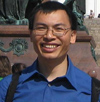Important Dates
Abstract Registration:November 28, 2011
Full Paper Submission:December 12, 2011
Acceptance Notification:February 13, 2012
Camera Ready and Early Registration:February 27, 2012
One Minute Madness Submission:May 6, 2012
Networking Conference:21-25 May, 2012
Networking Conference
Keynotes
Xiaoming Fu (University of Goettingen, Germany)
Content Distribution: from Client/Server to Content-Oriented Publish/Subscribe System
Tuesday, May 22, 9:00-10:00, Room: 155
Chair: Joerg Widmer

Xiaoming Fu is Full Professor of Computer Science at the Institute of Computer Science, University of Goettingen and leading the Computer Networks (NET) Research Group. He received his bachelor (1994) and master (with distinction, 1997) degrees from Northeastern University, Shenyang, China, and his Ph.D. (2000) degree in Computer Science from Tsinghua University, Beijing, China (supervisor: Professor Yaoxue Zhang). Prior to joining Goettingen, he worked with Prof. Dr.-Ing. Adam Wolisz as a research fellow at the Telecommunications Networks (TKN) group, Technical University Berlin until September 2002. Between 2003 and 2005 he also served in the European Telecommunications Standards Institute (ETSI) as an Expert in Specialist Task Forces in Internet Protocol (Version 6) Testing. He was/is a visiting scholar at the University of Cambridge (host: Prof. Jon Crowcroft) in 2005 and 2007, a DAAD visiting professor at Columbia University (host: Prof. Henning Schulzrinne) in 2008 and 2009, a Fulbright Scholar Visiting Professor at UCLA (hosts: Prof. Lixia Zhang and Prof. Mario Gerla) in academic year 2009/2010, and a ChangJiang Scholar Visiting Professor at Tsinghua University. Since October 2010 he serves as Vice Chair of the Technical Committee on Computer Communications (TCCC), IEEE Communications Society (ComSoc), and since November 2011 as Chair of the Internet Technical Committee of the IEEE ComSoc and Internet Society (ISOC). He is a senior member of IEEE, a member of ACM and a member of GI.
Abstract
From the conventional client/server model to peer-to-peer (P2P) and content distribution networks (CDNs), a variety of solutions have been developed towards efficient content distribution over the Internet. Information-centric networking (ICN) is a next paradigm for content distribution, which provides substantial flexibility for users to obtain information without knowing the source of the information or its current location. I will describe some of the work we are currently doing in the COPSS project which aims to build a content-oriented publish/subscribe infrastructure which supports large-scale and time-sensible ICN applications such as Massively Multiplayer Online Role Playing Game (MMORPG). Using trace-driven simulation, we demonstrate that COPSS can achieve scalable and efficient content-centric pub/sub-based content delivery, providing considerable performance improvements over traditional server-based system.
Matthew Finnie (Interoute, United Kingdom)
In the first 40 years technology and networks have fundamentally changed the world, so what’s left?
Wednesday, May 23, 9:00-10:00, Room: 155
Chair: Li Erran Li

Matthew Finnie is the Chief Technology Officer (CTO) of Interoute, the operator that owns the largest Next Generation Network covering the European Union, from London to Warsaw, from Stockholm to Sicily and beyond into the Continent's emerging economies. Interoute is also the owner of Europe's largest cloud services platform. Matthew drives the company's advanced services strategy, including developing the platform that has allowed the company to launch its industry-leading VOIP, Ethernet and Media products. Trained as an electrical engineer, he helped develop early IP-product innovations, including one of the first commercial applications of VOIP a decade ago. As head of the Enterprise Service Development Group at Vocaltec, he worked with European/US carriers and multi-national corporations to launch converged communication services. Matthew was also the co-founder of US-based Internet start-up Insitu, which developed real-time IP collaboration tools. Matthew has degrees in electrical and electronic engineering and marketing.
Abstract
40 years ago is pre-history for many technologies, we had to wait 20 years for the first commercial signs of the internet, 20 years on it's a different world. We have revolutionised the way in which we communicate, shop and live. Despite this we are only at the tipping point, the way in which we build these platforms to deliver services has remained stubbornly silo’d along traditional technology lines. This talk looks forward and using history as a guide gives an insight into the next fundamental technology convergence between computer and network that will change the communication and content provider landscape forever.





